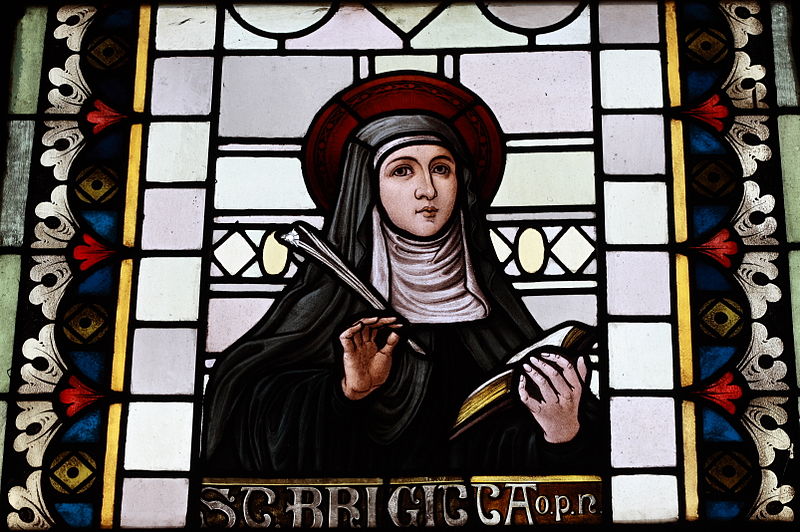(Stained glass window of Brigid of Kildare, St. Thomas’ Church, Houverath, Germany, courtesy of Wikimedia Commons)
Daily Office Readings for the feast day of Brigid of Kildare, Friday, February 1, 2019:
I should like a great lake of beer for the King of Kings.
I should like the angels of Heaven to be drinking it through time eternal.
I should like excellent meats of belief and pure piety.
I should like the men of Heaven at my house.
I should like barrels of peace at their disposal.
I should like for them cellars of mercy.
I should like cheerfulness to be their drinking.
I should like Jesus to be there among them.
I should like the three Marys of illustrious renown to be with us.
I should like the people of Heaven, the poor, to be gathered around from all parts.
–Poem attributed to Brigid of Kildare
What’s not to like about someone who envisioned Heaven as a lake of beer with enough hospitality to satisfy everyone through eternity, and everyone, rich or poor is invited?
Whether Brigid actually wrote this poem or not, it still speaks as a testimony to the generous hospitality that defines her character. Much of the story of Brigid is shrouded in mystery–some recent sources claim that she was not a real person, but merely a “Christianization” of the Druid goddess of the same name–yet at the same time some common facts are noted in her hagiography, so chances are, the correct answer is “all of the above”. Odds on, she is a conglomerate–a real person who inherited some crossover reputation from Ireland’s Druid past.
Tradition has it that she was born in 451. Her father Dubhthach was a poet in the king’s court, a chieftain and a Druid, and her mother Brocca was a Christian slave. Brigid converted to Christianity at a young age, and even her early life was one of a generous spirit. According to one tale, young Brigid gave away her mother’s entire store of butter, and her father’s jeweled sword to a beggar (while he was planning to sell her to the king’s household because she wouldn’t stop giving things away to the poor). The King of Leinster realized this was no ordinary youngster, and instead convinced her father to grant her freedom.
Brigid became a nun as a young woman, and her generous and inclusive spirit continued to be at work. She founded dual monasteries (one for men, one for women) in Kildare, as well as schools of art, metalworking, and a scriptorium–in fact, the one believed to have possibly produced the Book of Kells, or at least one just like it. Her monasteries were known for their hospitality to guests and travelers, and she was known for her skills in brewing beer. Many miracles have been attributed to her, some rather fanciful, but she allegedly had a reasonably long life for that time, dying at the age of 72.
Pick away all the fanciful bits, and what is left is a devout woman with an amazingly generous heart, who lived as if that lake of beer was right here on earth. Brigid challenges us to go beyond the measured, reasonable generosity that always takes into account that something might run out. Our very human selves are often capable of being generous, but also almost always with an eye on the budget line. Brigid operated as if being generous was the only budget line, because she understood God’s economy as one of abundance.
How might our generosity change if we, too, could truly envision that lake of beer?
Maria Evans splits her week between being a pathologist and laboratory director in Kirksville, MO, and gratefully serving in the Episcopal Diocese of Missouri . She presently serves as Interim Assistant Priest at two churches, Church of the Good Shepherd in Town and Country, MO, and St. Luke’s Episcopal Church in Manchester, MO, as they explore a shared ministry model.

